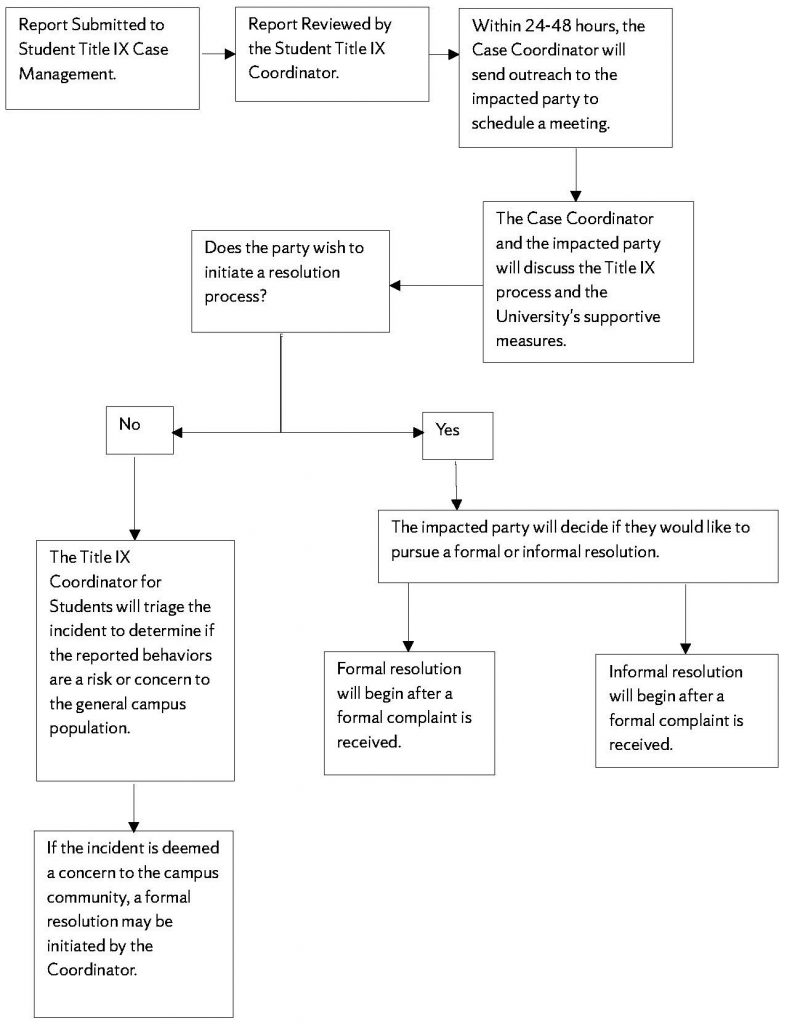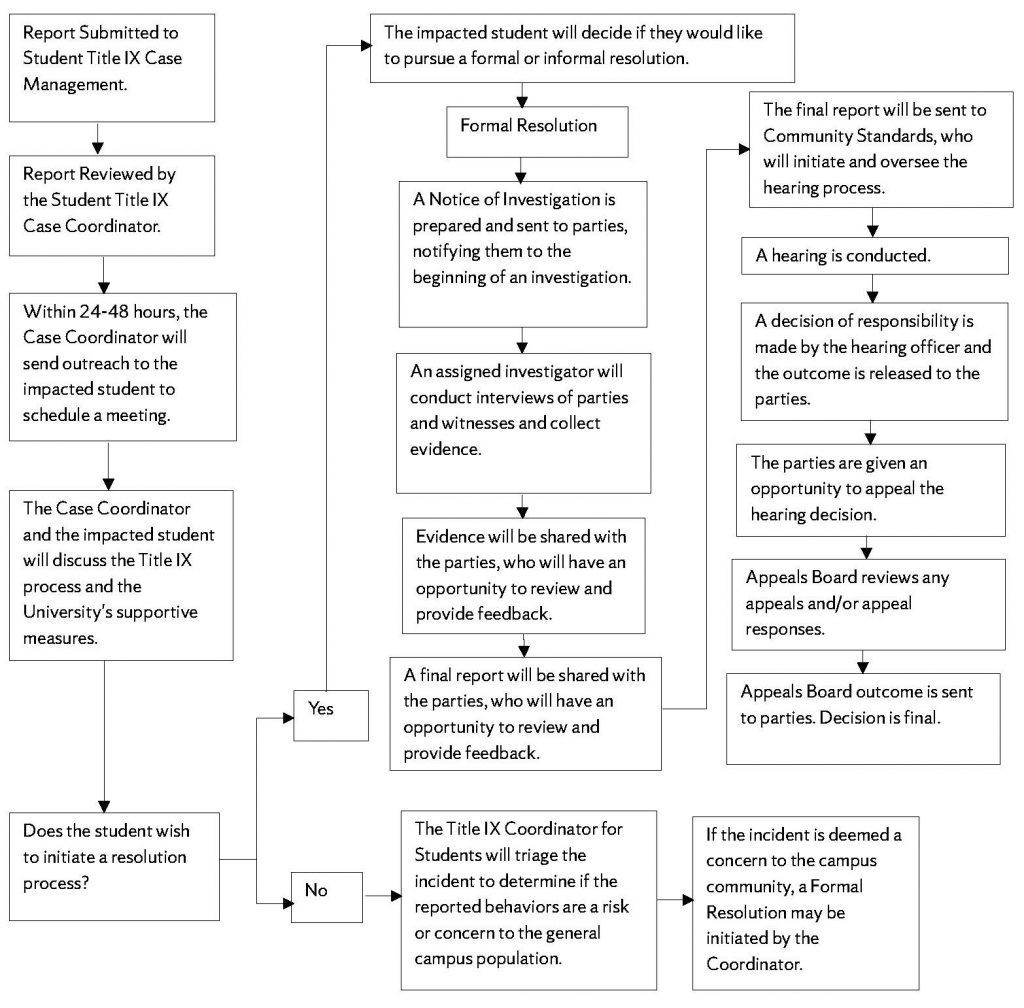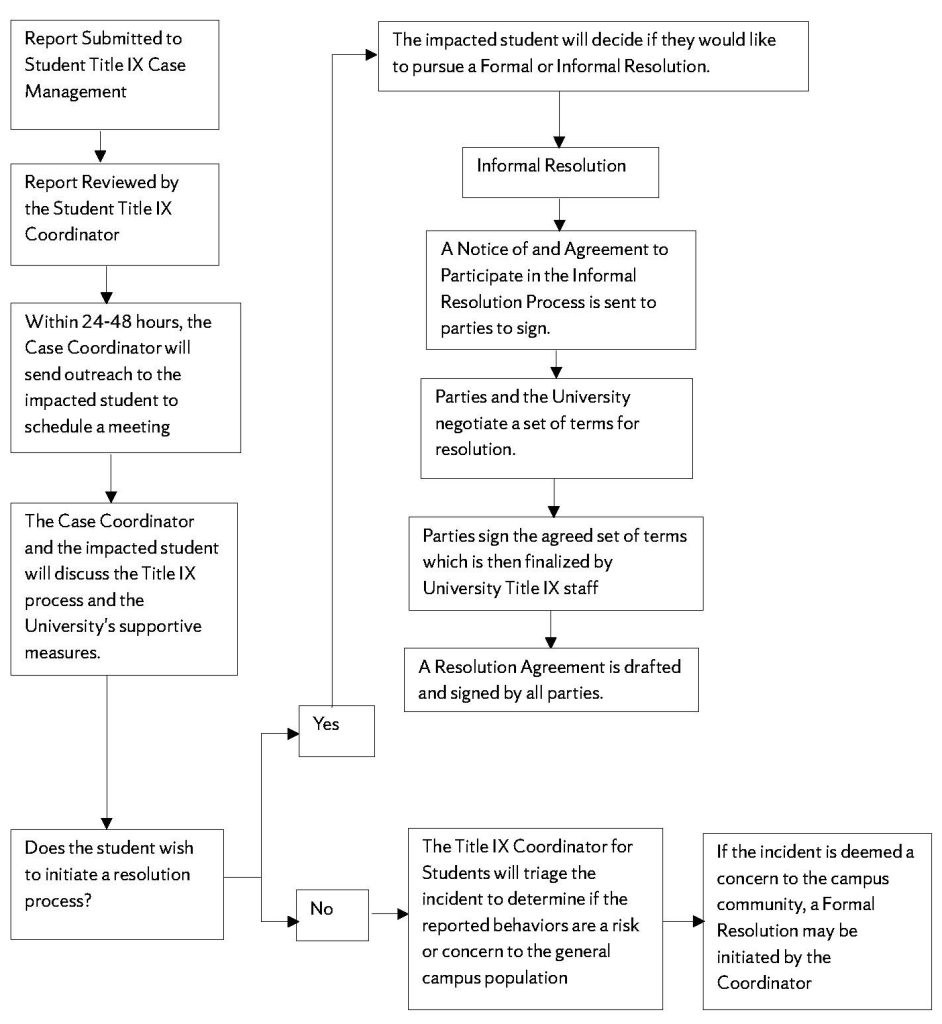Syracuse University has several different reporting options available for sexual and relationship violence. Note that the impacted individual controls what, if any, resolution process they want to pursue. The exception to this is when the Director of Student Title IX deems the alleged actions a threat to the greater campus community and determines to initiate a Formal Process.
Incidents involving University staff or faculty can be submitted using the button above and the report will be redirected to the Office of Equal Opportunity, Inclusion, and Resolution Services. For more information regarding complaints involving staff or faculty, please visit their page.
What Happens After I Report An Incident?

Frequently Asked Questions
Am I required to report if I experience sexual harassment, sexual assault, sexual exploitation, stalking, or relationship violence?
No, you have the right to decide whether to report or not, and which reporting options you may choose to use. As students, if you are impacted by sexual or relationship violence or harassment and choose to disclose such behavior, you can report to the Department of Public Safety, the Student Title IX Case Management office, or local law enforcement. Students also have the right to request both Syracuse University and law enforcement responses.
To note, much of Syracuse University’s staff and faculty are “responsible employees”, meaning they are required to disclose all information relating to discrimination, harassment, and/or sexual misconduct reported to them, including names of the involved parties, with the Title IX Coordinator for Students. Confidential resources, which you can read about further down, are not required to share such information.
What if I’m unsure whether to file a formal complaint?
As an impacted student, you have the option to meet with our Case Coordinator for an intake meeting. The purpose of this meeting is to discuss options including supportive measures, filing a complaint for formal or informal resolution, as well as answer any questions you may have.
Should I file through Syracuse University or local law enforcement?
The University cannot advise on whether you should or should not report. However, you have the right to pursue a criminal complaint via law enforcement and/or pursue a formal complaint via the University Conduct process. You can also choose to pursue both consecutively or to pursue neither option. In cases involving alleged criminal conduct, the Department of Public Safety will assist an impacted person in making a criminal complaint if desired. Any criminal complaint will be forwarded to the appropriate law enforcement agency.
Contact the Department of Public Safety at 315.443.2224 or contact the Syracuse City Police at 315.442.5200.
Is there a time limit to when I can file a report?
Students may report incidents at any time, regardless of when the incident occurred. However, available University processes may be limited if the Respondent is no longer a student or if an extended period of time impacts our ability to collect information about the alleged incident.
What if my incident involves a staff or faculty member of Syracuse University?
If a University staff or faculty is involved in the incident, you can fill out our Title IX - Sexual/Relationship Violence and/or Stalking Report form, and your report will automatically be redirected to Equal Opportunity, Inclusion, & Resolution Services. Please visit their website for more information regarding these incidents.
What are confidential resources?
Confidential resources are individuals who are neither required nor permitted to provide any information regarding an incident of discrimination, harassment, and/or sexual misconduct to any outside party without the consent of the individual involved in the incident. More specifically, these individuals will not provide any information about a reported incident to Student Title IX Case Management, the Office of Equal Opportunity, Inclusion, and Resolution Services, or any law enforcement agency without the student’s permission.
These resources are limited to therapists, Sexual and Relationship Violence Response Team members, health care providers from the Barnes Center at the Arch, chaplains at Hendrick’s Chapel, University Ombuds (graduate students only), and the Department of Athletics physician. All other staff and faculty are required to report incidents shared with them to Student Title IX Case Management.
You can read more about these resources on our Confidential Reporting Resources page.
What are private resources?
Private resources are considered all remaining staff or faculty who are not confidential resources. These individuals are required by law to disclose information learned from a reporting individual or bystander with the relevant office, but they will not disclose any private information to outside parties.
All employees not labeled as a confidential resource above are considered “responsible employees” and are required to report all the details regarding an incident of sexual or relationship violence to Student Title IX Case Management (or EOIRS if University staff/faculty are involved).
What if I do not want a Formal Complaint to be filed?
The University endeavors to respect the wishes of a Complainant to not pursue a Formal Complaint, to not be identified and/or to not participate in the process. Where possible, the University attempts to address complaints in accordance with the Complainant’s wishes. However, the University may not always be able to do so, and may be limited in its ability to address incidents of Prohibited Conduct without full participation by a Complainant.
The University may deem it necessary to file a Formal Complaint on behalf of a Complainant. In evaluating the appropriate manner of resolution, including whether the Title IX Coordinator for Students will file a Formal Complaint in the absense of a Formal Complaint by the Complainant, the Title IX Coordinator for Students, in consultation with subject-matter experts as needed, will consider the following factors:
- The seriousness, persistence or pervasiveness of the reported conduct;
- Whether the Respondent has a history of violent behavior or there have been other complaints or reports of harassment, misconduct, or Prohibited Conduct against the Complainant;
- Whether the incident represents escalation in conduct on behalf of the Respondent from previously noted behavior;
- Whether the circumstances suggest there is an increased risk of the Respondent committing additional acts of sexual violence or other violence, including but not limited to reported threats of sexual violence or other violence by the Respondent against the Complainant or others;
- Whether the Respondent reportedly used a weapon or force;
- Whether the conduct was reportedly committed by multiple individuals;
- Whether the Complainant is a minor;
- Whether the Respondent is an employee; and
- Whether the institution possesses other competent means to obtain relevant evidence.
In order to protect the community, the University may be obligated to investigate and adjudicate serious incidents even when the Complainant would prefer otherwise. A Complainant may withdraw a Formal Complaint at any time, but the University may be compelled to continue the associated investigation or conduct process. The University reserves the right to take action in response to any incident that comes to its attention.
What happens when an incident is reported?
Upon receipt of a report of potential Prohibited Conduct from a Complainant, Responsible Employee, or other individual, the Title IX Coordinator (or designee) will promptly – typically within 48 hours – contact the reporting or impacted individual(s) to request a meeting to gather supplemental information (if any) and explain the University’s processes. If the meeting is with a potential Complainant (the individual who is reported to have experienced the Prohibited Conduct), the outreach will cover reasonably available Supportive Measures (available with or without filing a Formal Complaint); the process for filing a Formal Complaint; the Complainant’s right to report the alleged conduct to law enforcement (either on campus or off); the difference between privacy and confidentiality; and the right to be protected from Retaliation.
In addition to the initial conversation and any subsequent meetings with the Complainant, the University will provide the Complainant with written information about resources, procedural options, including local law enforcement resources as applicable, and reasonably available Supportive Measures. This written information will include a notification about the process for seeking disability-based accommodations, academic adjustments, and/or auxiliary aids under Section 504 of the Rehabilitation Act and/or the Americans with Disabilities Act.
The Complainant can then initiate a resolution process by completing a written Formal Complaint. Syracuse University offers two resolution processes: Formal Resolution and Informal Resolution.
What does a Formal Resolution process look like?
The Formal Resolution process entails completion of an investigation conducted by a Title IX Investigator. The investigation includes party and witness interviews, evidence collection, the preparation of a report, a hearing, and the opportunity to appeal the hearing decision. The Complainant and Respondent, along with their advisors, will be given opportunities to review the evidence and the report before the end of the investigation phase.

For a full overview of Syracuse University’s procedures, please read our procedures here.
What does an Informal Resolution process look like?
The informal process is facilitated by a Title IX team member and requires that all parties and the University agree to initiate an informal resolution and agree upon the terms and conditions that will then be included in a written agreement. The informal resolution is completed when the written agreement is signed by all parties and the facilitator.

For a full overview of Syracuse University’s procedures, please read our procedures here.
